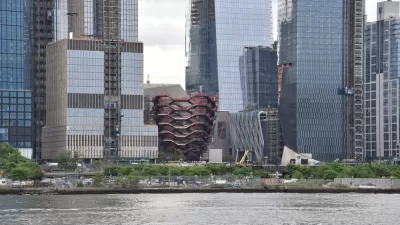Eleven years into a likely twelve-year tenure as director of the New York City Planning Department, Julie Satow explores the accomplishments, and unfinished agenda, of Amanda Burden.
With 40 percent of the city rezoned, large swaths of its waterfront reborn, and an abandoned railroad remade as a hugely successful park during her tenure, observers are beginning to reflect on the unprecedented changes that have shaped New York City since Burden was appointed head of the Planning Department in 2002 by new mayor Michael Bloomberg.
"Her fans say that Ms. Burden is a visionary who will leave behind a much-improved city. 'There is no question that under Amanda's leadership, New York has experienced a renaissance,' said Vin Cipolla, president of the Municipal Art Society of New York, 'with more development of parkland, waterfront and infrastructure over the last 10 years than in the 100 years before it.'"
"But critics say that the sum total of Ms. Burden's ambitions will be a gentrified city that no longer has a place for working-class New Yorkers."
"The overall effect of the city's rezonings has been incredibly dramatic in terms of the creation of expensive, market-rate housing and typically middling at best in terms of affordable housing," said Andrew Berman, the executive director of the Greenwich Village Society for Historic Preservation."
Satow traces Burden's trajectory from "it girl" of the go-go 1960s, to her training as an urban planner, to her surprise selection by Mayor Bloomberg. Although her accomplishments to date will shape the city for decades to come, with the Bloomberg administration's window closing (and likely her's with it), a number of high-profile projects (including the rezoning of Midtown East) are left to be completed. Meaning Burden's imprint on the city is far from finalized.
FULL STORY: Amanda Burden Wants to Remake New York. She Has 19 Months Left.

Planetizen Federal Action Tracker
A weekly monitor of how Trump’s orders and actions are impacting planners and planning in America.

Chicago’s Ghost Rails
Just beneath the surface of the modern city lie the remnants of its expansive early 20th-century streetcar system.

San Antonio and Austin are Fusing Into one Massive Megaregion
The region spanning the two central Texas cities is growing fast, posing challenges for local infrastructure and water supplies.

Since Zion's Shuttles Went Electric “The Smog is Gone”
Visitors to Zion National Park can enjoy the canyon via the nation’s first fully electric park shuttle system.

Trump Distributing DOT Safety Funds at 1/10 Rate of Biden
Funds for Safe Streets and other transportation safety and equity programs are being held up by administrative reviews and conflicts with the Trump administration’s priorities.

German Cities Subsidize Taxis for Women Amid Wave of Violence
Free or low-cost taxi rides can help women navigate cities more safely, but critics say the programs don't address the root causes of violence against women.
Urban Design for Planners 1: Software Tools
This six-course series explores essential urban design concepts using open source software and equips planners with the tools they need to participate fully in the urban design process.
Planning for Universal Design
Learn the tools for implementing Universal Design in planning regulations.
planning NEXT
Appalachian Highlands Housing Partners
Mpact (founded as Rail~Volution)
City of Camden Redevelopment Agency
City of Astoria
City of Portland
City of Laramie





























